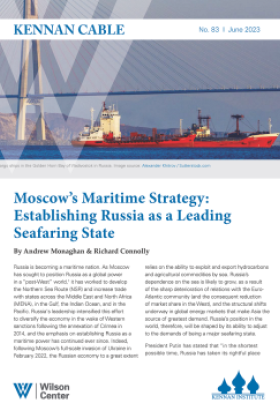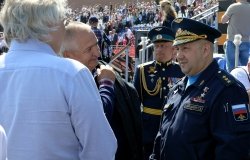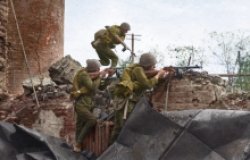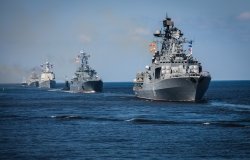The Battle of Salamis: Ancient Lessons for Modern Statecraft
Barry Strauss, Professor of History and Classics, Cornell University
Overview
Transcripts from the event.
JOHN SITILIDES: It is a pleasure to welcome you, our colleagues and friends, to the Woodrow Wilson International Center for Scholars for a different kind of program under the Southeast Europe Project. Prof. Strauss and I just enjoyed a good discussion together over lunch, and I was able to learn more about him and his professional and academic work. This crystallized in my mind the need for this type of innovative programming, whether it's here at the Woodrow Wilson Center, at other foreign policy institutions in Washington, or in any type of an institution that promotes open forum and dialogue on critical issues today, because there is in fact much to be learned from the lessons of warfare, diplomacy, and the hallmarks of international relations dating back two-and-a-half-thousand years.
The classics do very much matter today, and even if the topic of today's program is not, on the surface, immediately relevant to what is happening in Southeastern Europe, the battle that took place at Salamis has much to offer modern leaders in terms of military planning, democracy, and foreign policy, as Professor Strauss will lay out for us today. These are relevant tools, whether we're dealing with the countries of Southeastern Europe, immediately adjacent countries and regions, and certainly some of the more crisis-laden areas in the world today.
Professor Barry Strauss is a classicist, a military historian and, if I may say so myself, a public diplomat, at Cornell University. In addition to the book, which we are to hear much of today, there is his next book on the Trojan War, which he is currently writing and is scheduled for publication in early 2006. We look forward to hearing more about that book, as well, and to communicating that information to you and to our friends and subscribers through our website.
Barry Strauss's biography and additional information are available at his website, at Barrystrauss.org.
BARRY STRAUSS: Dotcom.
MR. SITILIDES: Dotcom, thank you – very businesslike of you – Barrystrauss.com. I stand corrected. And I cannot encourage you enough to continue to enjoy today's presentation buying his book, having it signed by the author before you leave here today, and reading it.
On that note, I welcome you here today, and I rapidly turn the microphone over to my friend and colleague, Professor Barry Strauss.
MR. STRAUSS: Thank you, John. Also I want to thank John and thank his assistant Andri Peros for being so hospitable and inviting me here and making me feel at home. Can everyone hear me? Excellent.
Okay, well, as John said today, I'm going to talk about the Battle of Salamis, and in 20 minutes I'm going to tell you all about the battle and its relevance to the world today, and I'll try to say something that's relevant to southeastern Europe as well.
Okay, the Battle of Salamis, as I'm sure many of you know, took place in 480 B.C., so at the end of the month of September, and it took place here in the Salamis Straits, just off the city of Athens. In the slide we're looking at – in the foreground we've got the Island of Salamis. This is the Coast of Attica with the Acropolis and the City of Athens being over here off the map, and the battle taking place here in these narrow waters – only about a little more than a mile wide at its narrowest point.
Who was the battle between? Well, on the one side there was an invading armada, an army, from the Persian Empire, and the Persian Empire was the largest empire in human history to date and the largest political entity on Earth, comprising – a guesstimate – 20 million people. And they had about 700 warships. On the other side was a small coalition of Greek city-states – very small in fact. Of the approximately 300 Greek city-states in the region, only 31 were in the coalition – a coalition led by Athens, Sparta, Corinth, Aegina. Those were the best-known states that were part of it. And it was their job, and that of their 368 ships, to defeat the Persians. The Persians had already invaded Central Greece, defeated the enemy, defeated the Greeks on land there at Thermopylae, famous for the heroic stand of the Spartans, had fought the Greeks to a draw at the naval battle of Artemisium, both of these in late August. Now a month later the Persians had invaded Attica, they had burned the temples of the Acropolis to the ground, they had destroyed much of the city, and the only thing that stood between them and further progress to the Peloponnesus was the Greek navy.
Now, the ship of the line, to use an anachronistic expression, of naval warfare at the time was the trireme. Trireme was a galley. Here we are looking at a hypothetical reconstruction of a Greek trireme – an Athenian trireme in fact – it's called Olympias. It's the result of a magnificent obsession. It was built by a joint Anglo-Hellenic team in the 1980s and it was rowed and sailed for five summers of tests to see what we could learn about the functioning of ancient warships. You can clearly see the ram and you get some sense of the three banks of rowers, 170 rowers. Triremes were essentially floating missiles. The object was to ram your enemy's ship in the quarter and to quickly back off before your enemy could do damage to you. There were a small number of Marines and archers on board ship. And think away the masts, which were not used in battle – no sails used in battle.
This ship is a little bit misleading. As I said, this is what an Athenian trireme would have looked like at the height of Athens naval power around 400 B.C. The Battle of Salamis is just the very beginning of Athens' naval power. Athens only had a navy for three years. They only built the navy – decided to build the navy three years before. And the Athenian warships at Salamis were not the sleek and elegant trireme you see here. We don't have an ancient illustration of them, but we know from Herodotus, the great historian – and our best source of the battle – we know that the Athenian ships were heavier and shower than their Persian ships – their Persian counterparts. The Persian triremes were light and fast; the Athenian ones were slow and heavy. And we'll get – in a minute we'll see what that was all about.
So here's what I was referring to before. The timeline of 480, B.C., you can see that in May and June the Persians crossed the Hellespont, or the Dardanelles, which they literally bridged with two bridges of boats. They had – we can estimate, scholars, about 150,000 men in their army. They also had a fleet with as many as 1,200 warships in it. The Persian strategy was to march through Northern and Central Greece, sail alongside meanwhile with their fleet. And as much as possible they are waging psychological warfare. Their goal was to frighten the Greeks into neutrality or surrendering – joining the Persian side. And as the numbers before – I mentioned – suggest, by and large this strategy was successful. Most of the Greeks felt they have no choice but to sit this one out or join the Persians. The big exceptions, though, and the most important ones were Athens, Sparta and Corinth. After winning – after fighting these engagements in August, which I mentioned, then comes the Battle of Salamis in late September.
Here we're looking at the Persian great king. Seated on the throne, Darius, and standing behind him is his son Xerxes, who was crown prince at the time. Darius, a great builder of empire, died in 486. Xerxes was a young man in his 30s. He replaced his father on the throne. The war with Greece had been started under Darius. Darius had been responsible for the Persian expedition to Marathon in 490, a famous failure. Xerxes inherited the war and wanted to finish what his father had started. He wanted to defeat the Greeks once and for all.
Unfortunately for Xerxes, the Greeks, in the person of this gentleman, were led by one of the most extraordinary statesman of ancient, and indeed we might say of all of, history. His name was Thermistocles, and this is a portrait bust of him that was discovered outside Rome I believe in the 1930s. Or maybe it was the 1950s – anyhow, in the 20th century. It is a Roman copy of a Greek original and most art historians are satisfied that it is a genuine copy and that there was a classical Greek statue that looked like this. And that's an extraordinary fact because, as you can see, this guy did not look like the standard classical statute. There is no classical nose. He does not have pleasing features. He's kind of tight-lipped and he's round faced, and he looks just a little bit like a thug. (Laughter.) And I think this is purposeful.
I think this is the impression that he wanted to give, because Thermistocles' entire life and his policy and strategy was an aggressive policy and shaped by the fact that he was an outsider. He was not a member of one of the charmed inner circle of families in the Athenian aristocracy. He was not a poor boy, but he did not come from the right family and did not have the right kind of education. He was proud of this. He famously said of himself, "I may not know how to sing or tune a lyre, but I know how to make a city great and free."
Now, insofar as he was able to rise from the outside to the pinnacle of power in Athens, and at one point in Greece, he is a product and could be a product of nothing other than a democracy. And Athens, as you know, had become a democracy about 30 years before the Battle of Salamis. It was one of the first democracies in Greece and therefore one of the first democracies in history, and a part of Athenian democracy, men like Themistocles were able to rise to power. Democracy allowed for outsiders to come to the fore and for talent that would not have had a chance to be exploited, democracy allowed that talent to be exploited. It also allowed the perspective and point of views of an outsider to become the policy of the land.
In particular, Themistocles had participated in the Battle of Marathon in 490. This was a land battle. The land army in ancient Greece and in Athens was the prestigious arm of the military – the senior service if you will – and the service, the branch of the military that was preferred by the aristocracy. A famous story about Themistocles is that he couldn't sleep at night after the battle because he dreamt about the trophy of Marathon. The trophy had been won not by him but by one of his rivals, the great General Miltiades (ph). Either because of this or because he had the broadminded view of an outsider, Themistocles was convinced after Marathon that the future of the Athenian military lay at sea. He believed that the Persians would never be satisfied with their defeat in 490. They'd never accept this verdict that they would return and try to conquer Athens, that this time they would come with a huge navy, and that the only way the Athenians could defend themselves was by building a competitive fleet.
Unfortunately for Thermistocles, Athens didn't have a fleet. It had a small fleet but not one that could compete with a large world-class navy, and the Athenians were in no mood to spend the money required to build such a fleet. But because of a lucky find of silver in the Laurion silver mines in 483, Themistocles was able to persuade the Athenians to use this not for a tax rebate, as the other politicians wanted, but for the defense budget, and Athens began to build a navy of 200 ships.
Thermistocles' plan against the Persians was a remarkably bold plan: the Athenians would save their city by abandoning it. He believed, correctly, that the Athenian Army and a Greek army could never stop the Persians from invading Attica and from taking the city of Athens. Therefore he believed the only solution was for the Athenians to evacuate their country, lock, stock and barrel, every man, woman and child, approximately 150,000 people, if not more. They would go to the friendly city of Troezen, in the Eastern Peloponnesus, to the Island of Aegina and to Salamis. And there they would use Salamis as a base for a naval stand against the Persians.
When Themistocles went to the Athenian people and told them what his plan was, their response was a more elegant way of get lost; there's no way we will ever abandon our homelands and our gods to an invasion by the Persians. And only the most intense lobbying, the most intense arm-twisting, and ultimately the use of religion – I'd be happy to answer in the Q&A period how Themistocles manipulated religion. Only that persuaded the Athenians to agree reluctantly to abandon their country. And even then I think that many of them dragged their feet and waited till the last minute to go. So there were probably too many Athenians on Salamis and not enough in far-off Troezen and Aegina.
Here you see a map of the two sides, the two parties. You can see that the Persian empire stretches from the borders of northwest India, Pakistan, Afghanistan, through Iran, Iraq, Anatolia, Syria, the Levant, to Egypt, down to Libya and up into Thrace and Macedonia. It was enormous. Greece is tiny in comparison, perhaps two to three million people compared to the 20 million in the Persian Empire. And here in this close up you can see the largely Greek city-states of the western Coast of Anatolia. They were under Persian rule at the time and had little choice but to support the Persian invasion.
Here on this map – here is the Battle of Artemisium in August, the Battle of Thermopylae, and down here Salamis. Well, Thermistocles, in persuading the Athenians to evacuate their country and to go to Salamis and to prepare to fight there. Themistocles only won half the battle because he then had to persuade the other Greeks to fight at Salamis.
When the Persians came to Attica, they were frustrated in their hope of finding tens of thousands of people to deport – enslave and deport back to their empire because Attica had been evacuated. They did burn down the temples on the Acropolis, and they made their headquarters in Phaleron Bay (ph).
Approximately five miles away in the Salamis Straits, the Greek ships were based. The Athenians had the largest contingent of triremes, but the official head of the coalition was a Spartan – a Spartan admiral. And the Greek admirals on Salamis were, surprise, surprise, quarreling with each other, disagreeing about what to do. Thermistocles, representing Athens, the representative of the Island of Aegina, and some of the other city-states in the Saronic Gulf region, they all wanted to stand and fight at Salamis. The Peloponnesians, however, wanted to evacuate Salamis and make their stand in what they would have thought of as "Fortress Peloponnesus." They were building a makeshift wall across the Isthmus of Corinth about 50 miles to the West of Athens, and they wanted their fleet to be near the wall so that, as they said, if they got defeated they could get home on foot – not a very optimistic attitude.
Themistocles tried and tried to persuade the Greeks to agree to fight in Salamis. He pointed out that the entire strategy for a Greek victory was predicated on fighting the battle in the Salamis Straits. The reason is that the straits are a peculiarly narrow body of water. Anywhere else the battle would have been fought would have been much wider. Any narrow body of water was advantageous to the Greeks and disadvantageous to the Persians, first because, as I mentioned earlier, the Greek ships were heavy and slow; the Persian ships were fast and light. If they have enough space, fast and light shops can dance around a heavy and slow opponent and ram him at will. If they don't have enough space, if the two fleets are relatively close together, then the heavier ships have the advantage and they can do more damage than the lighter ships – the first reason why Themistocles wanted to fight in the Salamis Straits.
The second reason was that he knew that his ships were outnumbered by the Persians by approximately two-to-one. Again, if you outnumber the enemy, you want room to maneuver. If you are constrained to fight in a narrow space, you won't have room to maneuver and your advantage will become a disadvantage. There will be two many ships in your armada and they will simply bump into each other and the result will be history's biggest naval traffic jam.
There's a third reason as well, and that was a bit more tentative: if Themistocles could time the battle just right, he would be able to take advantage of the peculiar wind conditions in the Salamis Channel – but we'll see if there's time to talk about that.
The problem, as I said, is that the Greeks wouldn't go for it. They decided finally, after much dilly-dallying – on the 24th of September they decided that the next morning at dawn they would pack up and sail off to the Peloponnesus, giving up on fighting in the Salamis Straits.
It's now that Themistocles pulls off one of the most cunning tricks in the history of warfare. It is a double cross – a double cross such as rarely, if ever, has been equaled on the field of war. He realizes he cannot persuade the Greeks to fight at Salamis, so he decides he will force them to fight at Salamis by tricking the Persians into entering the Salamis Straits. And his trick is to send his most trusted slave, a man named Sicinnus (ph), by boat to bring a message to the king of Persia. The message is very simple: the Greeks are about to give up at Salamis and sail off to the Peloponnesus tomorrow morning. You must enter the straits at night and stop them, and if you do, my master, Themistocles promises that he will betray the Athenian fleet and turn it over to you as soon as dawn comes.
Xerxes, in spite of warnings to the contrary, went for it. Why did he go for it? For two reasons. First, because Themistocles was an excellent – had excellent intelligence. Because of his study of Persian tactics and because of high-ranking Persian officers that the Greeks had captured at Artemesium and brought to Corinth in chains and interrogated, by methods we can be sure weren't gentle. Themistocles knew that the Persian's preferred way to win a battle was to turn a traitor on the eve of a fight. So Themistocles knew exactly what the Persians were looking for and how to get their attention: give them a credible traitor.
Secondly, the other reason what Themistocles said worked is that it was largely true. It was true that the Greeks at Salamis were at their wit's end. It was true that the planned to evacuate the next morning. And if it wasn't entirely true that Themistocles was planning to turn traitor, later events bear out the fact that Themistocles was the kind of man who would rule nothing out. And it was at least credible that he might turn traitor. In any case, the Persians went for it, and that very night they launched their entire fleet and infiltrated the Salamis Straits by darkness. We know that ancient fleets were able to put measures into effect to move at night stealthily without being detected. We know that the Greeks found out in the pre-dawn hours, or somewhat earlier than that; let's say around 3:00 a.m., roughly, what they were up against. It was Themistocles great triumph and now the Greeks had no choice but to fight.
When the morning came, they did fight, and the Greeks had all the advantages I've already mentioned, as well as two additional ones. First, Themistocles knew that between 8:00 and 10:00 a sea breeze would blow up – blow up the channel from the Saronic Gulf – not a very big breeze, four to five knots, but just enough to unsettle the water and to be a problem for, A, sailors who weren't expecting it, and, B, sailors who had lighter boats, like the Persians. And in fact, the sea breeze does blow up and does upset the Persian boats just enough to give the Greeks the advantage.
The second thing that happens that's so useful for the Greeks is that the Persians are tired. They launch their ships at night after a full day's work the day before. They got little or no sleep all night because they had to keep those ships moving all night long, back and forth, back and forth, or else they could have rammed into each other. The Greeks, by contrast, spent the night on land and they were relatively rested compared to the Persians.
So all of these factors contributed to the Greeks' victory, and it was a smashing victory. We don't have reliable ancient numbers. In fact, we only have one set of numbers, and although we can't trust them I think that they are in the right ballpark, that the Persians lost 200 out of their 700 ships whereas the Greeks lost only 40 of their 368 ships. In addition, the Persians lost not just any old ships; they lost their best ships. The pride of the Persian fleet was the Phoenicians, and it's the Phoenicians who are most devastated in this battle. On top of that, the Persians had the problem that Persians didn't know how to swim. Persians believed that saltwater was demonic. They thought that saltwater was inherently evil. That's one of the reasons, by the way, why Xerxes has the Hellespont whipped. And as a result of this, Persians don't know how to swim, which led to their casualties as well.
It took the Greeks more than 24 hours to figure out this battle had been a smashing victory, so uncertain were the tides of war and so much – (unintelligible) – was there over the ancient battlefield. Here, by the way, is another view of the Salamis Straits, and if you look at the tugboat in the foreground, that's more the size of an ancient trireme than these freighters in the background. So they're very small indeed.
And here we can see one of the indirect results of the battle of Salamis, the Parthenon, which was built – funded by money that came in from the Athenian Naval Confederacy, the empire that followed the battle.
Well, let me now talk briefly about some of the lessons that we can get from Salamis, lessons for today. I've already mentioned the advantage of democracy in allowing new talent to come to the fore. I should – and also, democracy allows new ideas to come to the fore. It also makes the world safe for military strategies that involve the mass of the population. The only way for Athens to run a fleet was to use basically every able-bodied man in Athens. This included mainly men who were never allowed to be in the military before because they could not afford a suit of armor – they weren't wealthy enough. And the upshot was in the long term Athens became a more democratic society because those sailors were able to leverage the power they won at Salamis.
Another thing about – a lesson of democracy is the extraordinary job of leadership that Themistocles did in shepherding the Athenians along the right path to winning the battle. Sadly, it didn't pay off in the end for Thermistocles, who was forced into exile after the war by his jealous opponents and who ends up his life bizarrely at the Persian court where he he's turned traitor and gone over to fight for the Persian king.
Well, let me talk now – just also briefly add lessons for military studies and lessons for diplomacy – lessons for international relations. For the military first, Salamis is a great case study in the use of surprise as a force multiplier. When the Persians saw the Greek fleet at dawn ready to fight them and not ready to flee in terror, we can only imagine how shocked the Persians were and how unprepared they were for the battle that lay ahead.
The second thing we can see from Salamis is the principle of turning your weakness into a strength. The Athenians built heavy ships after 483 B.C., for a simple reason: they couldn't build light ones. The only way to row light ships is having a very experienced core of rowers. Light and fast ships are much less stable than heavy and slow ships and much more difficult to row. I believe – and this is my theory – that the Athenians had to build heavy ships because their inexperienced rowers could not row fast ships. And Thermistocles, knowing this, manages to turn that weakness into a strength by setting up the battle in the right place.
Finally, let me just say a little bit about allies. We see in the prelude to Salamis a very frustrating situation for Themistocles and the Athenians, and we see what might be called a dysfunctional coalition with each ally wanting to go his own way. And yet, in the end, it turned out to be the winning ticket; it turned out to be an unbeatable fighting coalition.
Is there a lesson in this? I think there is. The lesson is that when you have a civilization of free societies and free states, we can only expect that those states will disagree. It's part of the function of being free. And in fact, we can look on it as a strength rather than a weakness. It is better to have strong allies who disagree with you than to have weak allies who agree with you. As long as they are strong, and their independence of mind is a symptom of their strength, you know that ultimately – preferably by negotiation but, if necessary, by a trick – ultimately you'll find common ground. We can only assume that Thermistocles' trick was not simply a trick but that there were many in these allied armies who knew when push came to shove, they wanted to be standing with the Athenians, that ultimately their enmity towards Persia and their devotion to their individual freedom, the freedom of the Greeks was much stronger than their individual agendas.
And so, I think there are obvious ways that this lesson can be applied to American foreign policy today, to disagreements among our own allies into ways of looking at these disagreements not as a source of weakness but as a source ultimately of strength.
So let me leave it at that and turn the floor over to discussion.
MR. SITILIDES: Thank you very much, Barry, for a fascinating perspective on history and its modern application. And my sense is that some of the questions will relate to the Battle of Salamis itself and some of it will relate to your closing points on the lessons to be learned.
One interesting point about your final statement, about the issue of freedom and of enemies and the idea that perhaps in the modern world there are free nations that have differing notions as to what actually constitutes freedom. That's the basis for one of the larger debates that we see here in Washington and especially across the Atlantic Ocean, as well as the common definition of who and what constitutes the enemy today and in the years to come. I think that will be an ongoing debate, and we will see where some of these lessons to be applied.
But at this point I would like to turn it over to what clearly are a large number of hands that are up, so I'm going to start here and then here, sir. Please identify yourselves by name and any professional affiliation that you choose.
Sir?
Q: My name is Roderick Braithwaite (sp). At the moment, I'm a visiting scholar here at the Wilson Center. I've got two questions really. One is Themistocles' argument that it would be impossible to hold the Persians by land had been disproved several years earlier at Marathon. What changed? That's the first question.
The second question: the whole way that politics in Greece functioned at that time has always seemed to me a bit odd because not only Themistocles went over to the Persians, but so did Alcibiades, and the whole concept of what side you were on between Greek city-states but also between the Greeks and their supposed enemy. I mean, Alexander then became a sort of Persian. So it's more complicated than, say, us and the Russians used to be. And I wonder if you've got more comment on the state of mind which enables you to betray a country you just successfully defended, as in all these cases.
MR. STRAUSS: Yes. Well, first, the question about what changed in the land warfare. Why were the Athenians, with the help of just one small other city-state – on one other small city-state, Platia, were able to defeat the Persians at Marathon. Why did they – why were they so diffident about being able to do it again in 480 B.C.?
Well, first of all, at Marathon the Persians had made a fatal error. They had loaded – their advantage – their comparative advantage in land warfare was the cavalry. And they had loaded their cavalry aboard the ships, thinking they could use those ships to sail around to the city of Athens and get traitors within the city of Athens to open the gates. What they didn't count on was that some of their Greek support troops from Anatolia at Marathon were so pro-Athenian that they would give this news to the Athenians. Once the Athenians knew that the Persian cavalry wasn't there, they weren't particularly afraid of the Persian infantry because Greek had heavy-armed infantry; the Persians only had light-armed infantry. And it was that that allowed them to win at Marathon.
I think the reasons – the two reasons they were diffident in 480 were, one, they didn't expect the Persians to make the same mistake twice and, two, the numbers were totally disparate. Marathon was a pretty small – relatively small Persian expedition. The 480 expedition was an enormously large expedition. So it was very wearisome.
And finally, another point that I haven't brought in is that part of the Athenian calculation was based on their cynical, but accurate assessment of their allies, that the Peloponnesians and the Spartans would never be willing to risk their army in central Greece to defend Athens. It was just too great a risk for the Peloponnesians to fight a big battle in central Greece. They wanted to hold their men in reserve to defend the Peloponnesus. So, for all those reasons, the Athenians knew they were out.
As for your second question, yes, it is certainly true that at least on some levels, the boundaries between Greece and Persia were much more porous than we might expect. That's partly because in ancient times there was virtually nothing like modern nationalism, and much more of a sense that the differences among peoples were differences among dynasties or languages rather than among ethnic groups or nations. And secondly, because politics in Greece was played for keeps and the Persians made a practice of taking advantage of the large number of exiles that Greek politics kept generating.
Themistocles was not only ostracized from Athens, which means he was formally out for 10 years, but there was a price put on his head because his enemies claimed they had proof that he had negotiated with the Persians. I have no trouble believing he'd negotiated with the Persians, but I think he probably meant to use it for Athens' benefit. So, the only way to save his life really was to go to the Persian Empire.
MR. SITILIDES: Sir.
Q: Given the consequences of an emphasis on naval power and the democratization of – further democratization, could you say that the seeds of the Syracusan disaster were sown by the victory at Salamis?
MR. STRAUSS: Excellent question. When Thucydides – the Syracusan disaster – as most of you no doubt know, in 415-413 B.C., the Athenians try to conquer Sicily, and its lead city was Syracuse. And when Thucydides tells us about it, he caricatures the Battle of Salamis. He turns the Athenians into the Persians and the Syracusans into the Athenians. It's the Athenians who are overconfident and arrogant; it's the Syracusans who are plucky, who have the local knowledge, who come up with the innovative tactics. So I think you're right, the seeds for something like Syracuse were sowed at Salamis, and this i
Hosted By

Global Europe Program
The Global Europe Program is focused on Europe’s capabilities, and how it engages on critical global issues. We investigate European approaches to critical global issues. We examine Europe’s relations with Russia and Eurasia, China and the Indo-Pacific, the Middle East and Africa. Our initiatives include “Ukraine in Europe” – an examination of what it will take to make Ukraine’s European future a reality. But we also examine the role of NATO, the European Union and the OSCE, Europe’s energy security, transatlantic trade disputes, and challenges to democracy. The Global Europe Program’s staff, scholars-in-residence, and Global Fellows participate in seminars, policy study groups, and international conferences to provide analytical recommendations to policy makers and the media. Read more
Thank you for your interest in this event. Please send any feedback or questions to our Events staff.










